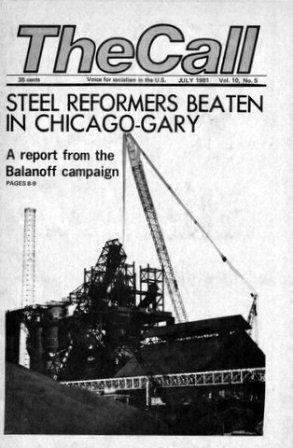
First Published: The Call, Vol. 10, No. 5, July 1981.
Transcription, Editing and Markup: Paul Saba
Copyright: This work is in the Public Domain under the Creative Commons Common Deed. You can freely copy, distribute and display this work; as well as make derivative and commercial works. Please credit the Encyclopedia of Anti-Revisionism On-Line as your source, include the url to this work, and note any of the transcribers, editors & proofreaders above.
Oppressed nations and people have fought their way into the consciousness of Marxist-Leninists by our revolts, uprisings and revolutions. The Leninist theory accurately analyzes and gives revolutionary guidance to oppressed peoples fighting national oppression.
Joseph Stalin’s theory of nations should be used to investigate the basis for the revolutionary national movements in the U.S. We must make clear why these movements exist. But it is incorrect to use this theory or the criteria which Stalin developed in the early 20th Century to explain away the basis for any national liberation movement against Yankee imperialism. In fact, that would be downright counter-revolutionary.
The role of a colonial administration and imperialism is to explain away oppressed nations’ struggles for liberation. Our job is to start with the facts of these liberation movements for self-determination, land and power, help organize the conditions for their victory, support these movements and encourage their revolutionary development.
Marxism must be used to struggle against doctrinaire approaches used to cool out the just and revolutionary demands of oppressed nations and peoples in the U.S. We must develop a Marxist-Leninist approach and put down the social-chauvinist approach.
In this light, we need a serious re-examination of the program developed by the October League and the CPML for the Chicano liberation struggle.
Members of the Afro-American Commission raised the following questions at the 2nd Congress: Why did our program rule out the right of self-determination? On what grounds? What has been the actual history of the Chicano people with regard to national development? We thought these were important-questions to be answered to give leadership in the Chicano movement and to fulfill our internationalist duties in resolving the national question in the U.S.
We must approach the national question with an eye towards examining the particular history of a nation or national group and understanding its particular features, dynamic and future direction. Nations don’t emerge on the scene full-blown. They are forged over a period of time, at first only being drawn together by certain common characteristics (i.e., territory, language, culture) and later proceeding towards economic cohesion under either capitalist or socialist conditions.
National groups precede the development of nations in this way. The question for us is to determine the exact history of a people, understand the effects of imperialist national oppression which may temporarily arrest or distort the maturing of its features, and most importantly, look at where these peoples are headed in terms of national development.
Some of us think a dogmatic approach may have been adopted in studying the history and development of Chicanos–upon which CPML raised the slogan “regional autonomy” instead of “right of self-determination.”
At the Congress we called for a thorough reexamination of the CPML position. And in re-studying this question we must also make a serious attempt to study concurrently the question of Native Indians in the area–as the histories are very intertwined.
Our entire departure point on the national question must be one of uniting the multinational working class itself, and uniting it with its closest and most reliable ally-the national movements. Especially in light of the rumblings of another round of upheavals among the oppressed nationalities and the depth of the current crisis–we must gain more clarity in order to help fashion a real, immediate program of struggle.